Key takeaways:
- Plant-based meals offer diverse flavors and nutritional benefits, enhancing overall health and well-being.
- Misconceptions about protein and dietary restrictions are common, but plant-based diets can be satisfying and creative.
- Challenges in transitioning include meal planning and social situations, which can become opportunities for sharing and education.
- Starting small with manageable changes, exploring local markets, and stocking essential ingredients can ease the transition to a plant-based diet.
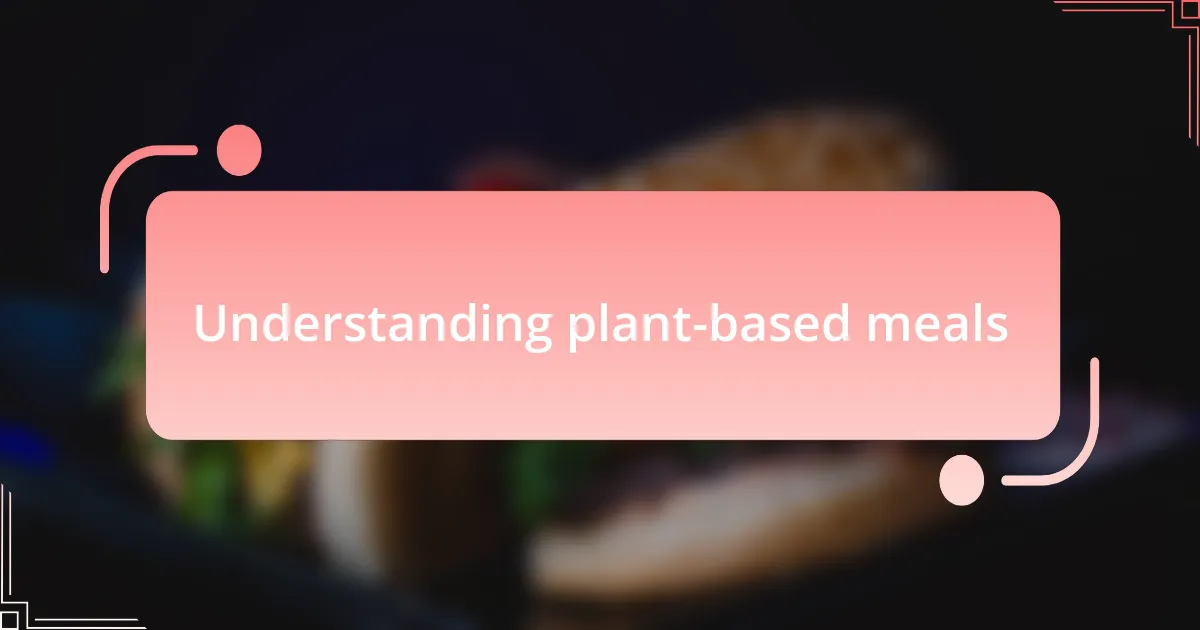
Understanding plant-based meals
Plant-based meals center around foods derived primarily from plants, including vegetables, fruits, grains, nuts, seeds, and legumes. The beauty of this approach lies in its variety; every meal can be a colorful palette of flavors and textures. I remember the first time I tried a hearty vegetable stir-fry packed with an array of vibrant produce. It was a revelation—who knew that such a simple combination could be so satisfying?
When I began exploring plant-based options, I often wondered if I would feel deprived without the usual animal products. Surprisingly, I found myself discovering new ingredients and techniques that opened up a whole new world of culinary creativity. For instance, experimenting with lentils and chickpeas allowed me to create dishes that were not only nutritious but also incredibly filling. Have you ever tried to make a vegan chili? It’s an experience that highlights how plant fibers can create a comforting meal that rivals traditional recipes.
Notably, understanding plant-based meals also involves recognizing the nutritional benefits they offer. With an emphasis on whole foods, these meals can be rich in vitamins, minerals, and antioxidants. I’ve noticed a significant uptick in my energy levels since incorporating more plant-based dishes into my diet. It’s fascinating to see how a conscious shift in eating can lead not just to physical health improvements, but a sense of well-being that resonates on many levels.
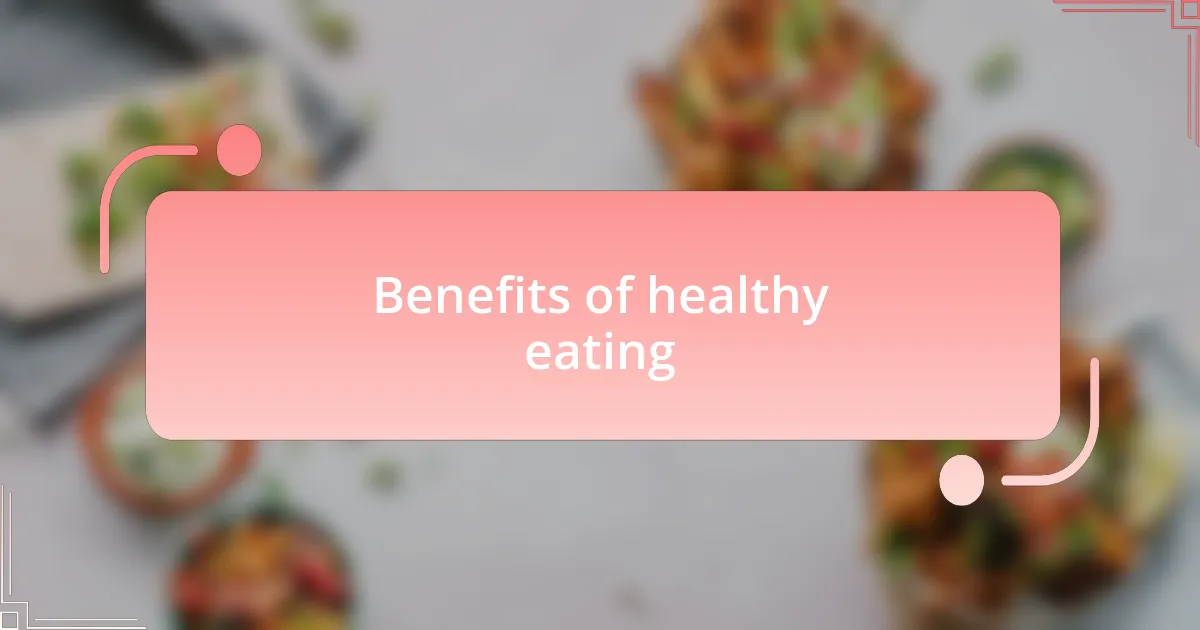
Benefits of healthy eating
Eating healthy offers a range of benefits that extend far beyond just nutrition. Personally, I’ve noticed that the more I prioritize whole, plant-based foods, the clearer my skin has become. It’s surprising to think that the foods we consume can impact our appearance so visibly. Have you ever experienced changes in your skin or energy levels just by adjusting your diet?
There’s also a growing body of research that supports the idea that healthy eating can enhance mental well-being. I recall a period when stress felt overwhelming, and I turned to nourishing meals packed with leafy greens and wholesome grains. The difference was palpable; not only did my mood improve, but I felt more focused and ready to tackle challenges. Could what we eat truly have a direct effect on how we feel emotionally?
Additionally, embracing a healthier diet can lead to long-term health benefits, such as reducing the risk of chronic diseases. I remember talking with a friend who made the switch to more plant-based meals after being diagnosed with high blood pressure. It was inspiring to see how a dietary change could empower someone to take control of their health. Isn’t it incredible how food can become a powerful tool in our overall wellness journey?
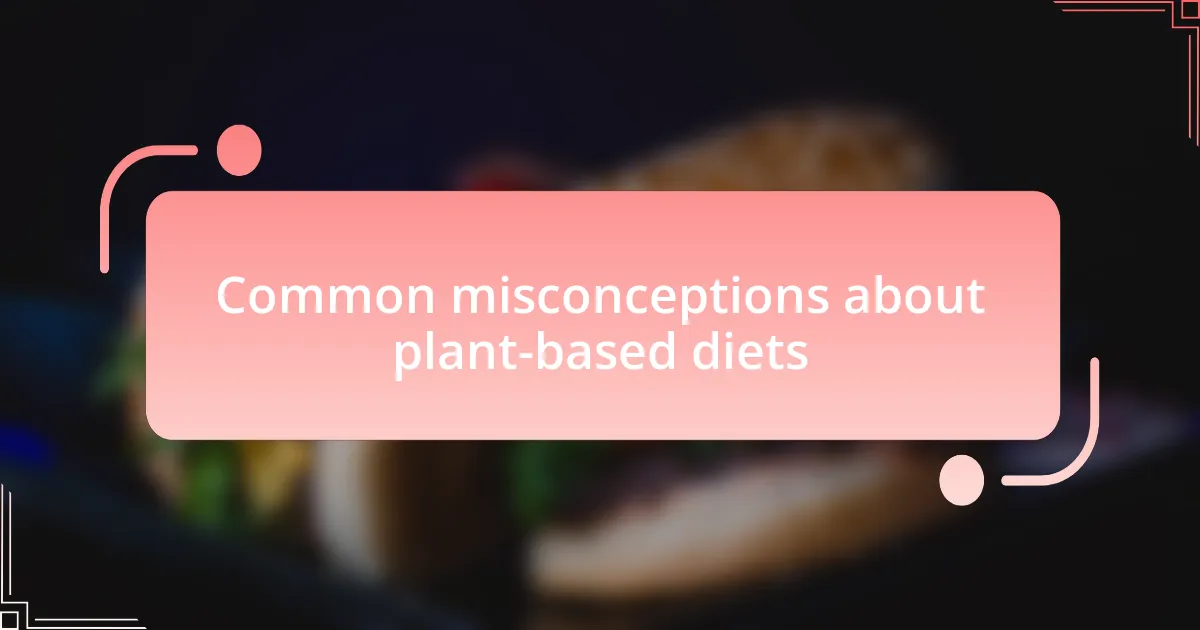
Common misconceptions about plant-based diets
One common misconception about plant-based diets is that they lack sufficient protein. I’ve had friends express concern about this when I shared my meal plans. But the truth is, there are plenty of plant-based sources rich in protein, like lentils, quinoa, and chickpeas. I remember whipping up a hearty lentil stew that not only filled me up but also fueled my workouts. It’s fascinating how easy it can be to meet nutritional needs once you know where to look.
Another myth is that eating plant-based means you have to give up all your favorite foods. I used to think that switching diets meant saying goodbye to comfort meals. However, I discovered amazing plant-based alternatives to familiar dishes. For instance, I’ve made creamy cashew Alfredo sauce that left me wondering why I ever craved traditional pasta sauce in the first place. Embracing new recipes can be an exciting culinary adventure rather than a sacrifice!
Lastly, some believe that a plant-based diet is overly restrictive and limiting. From my experience, this couldn’t be further from the truth. Transitioning led me to explore a vast array of flavors and ingredients I had never considered before. I’ve turned grocery shopping into a treasure hunt, searching for unique vegetables and herbs to include in my meals. It’s incredible how a change in perspective can transform your relationship with food and inspire culinary creativity.
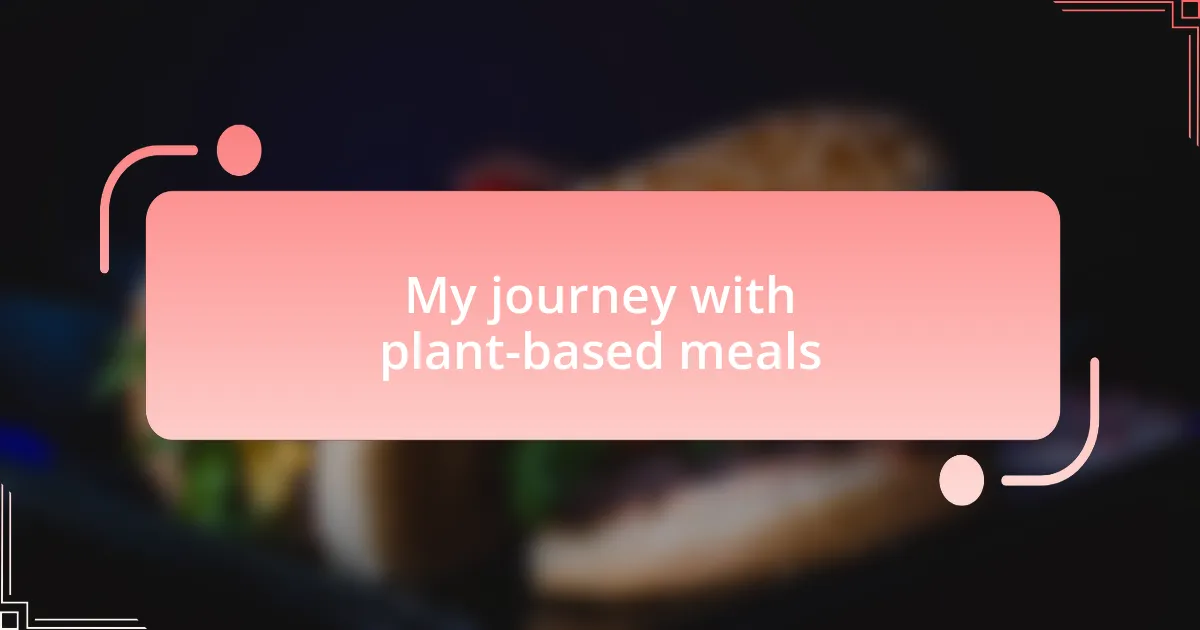
My journey with plant-based meals
When I first embarked on my journey with plant-based meals, I was both excited and nervous. I remember standing in the produce aisle, overwhelmed by the variety of vibrant fruits and vegetables. Have you ever felt the thrill of trying something completely new? For me, it was like opening a door to a whole new world of flavors. The first dish I tried was a sweet potato and black bean bowl, and I was amazed at how satisfying and nourishing it felt. It wasn’t just about eating; it was about discovering the depth of taste and texture that plants can offer.
As I continued to experiment, I found myself getting more creative in the kitchen. One evening, I decided to challenge myself to create a fully plant-based dinner for friends. I remember the mix of anxiety and excitement as I plated my mushroom-stuffed bell peppers. Seeing my friends enjoy the meal and ask for seconds was a pivotal moment for me. It struck me how sharing food can foster connection and joy, reinforcing the idea that plant-based eating isn’t just about health—it’s about community and experiences.
Looking back, this journey has shifted not only my diet but how I approach food altogether. I’ve become more mindful about my choices and the impact they have, both on my body and the environment. Isn’t it interesting how one small change can lead to profound insights? By embracing plant-based meals, I’ve developed a newfound appreciation for simplicity in ingredients while reawakening my senses to the joy of cooking and eating.
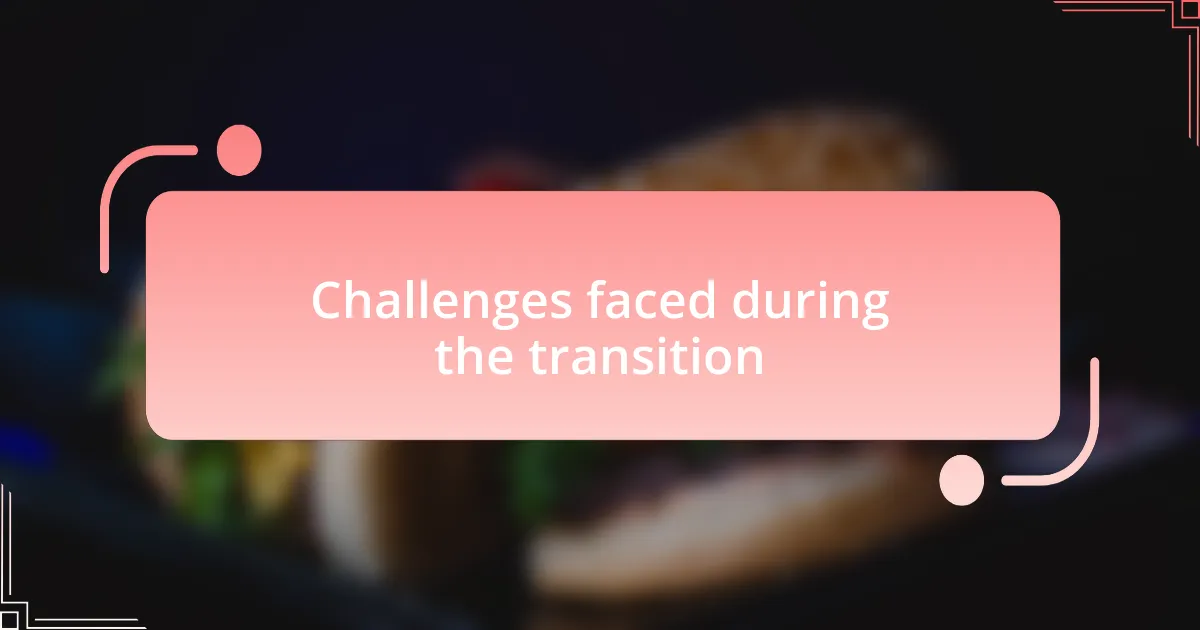
Challenges faced during the transition
Transitioning to a plant-based diet certainly came with its challenges. I remember the first time I attempted to replace meat in a recipe I cherished; it felt like I was missing a key ingredient in a puzzle. How do you replicate that savory, hearty flavor? It took me many tries to find satisfying alternatives that didn’t leave me feeling like I was sacrificing flavor or texture.
Another hurdle I faced was the initial planning required for meals. In my previous routine, I could whip up a dish without too much thought, but planning plant-based meals demanded more attention. I often found myself scrambling at the last minute, unsure of what to cook, and that led to frustration. Have you ever stood in front of your fridge and felt lost? I have, and it taught me valuable lessons about preparation and the importance of having a well-stocked pantry.
Social situations proved to be tricky as well. I distinctly recall attending a barbecue where options were limited. Watching everyone enjoy their burgers while I munched on a vegetable skewer felt isolating. It made me think, why am I doing this if it’s not enjoyable? That moment forced me to embrace the conversation around my choices and advocate for delicious plant-based options in group settings, turning what felt like a challenge into an opportunity for sharing and education.
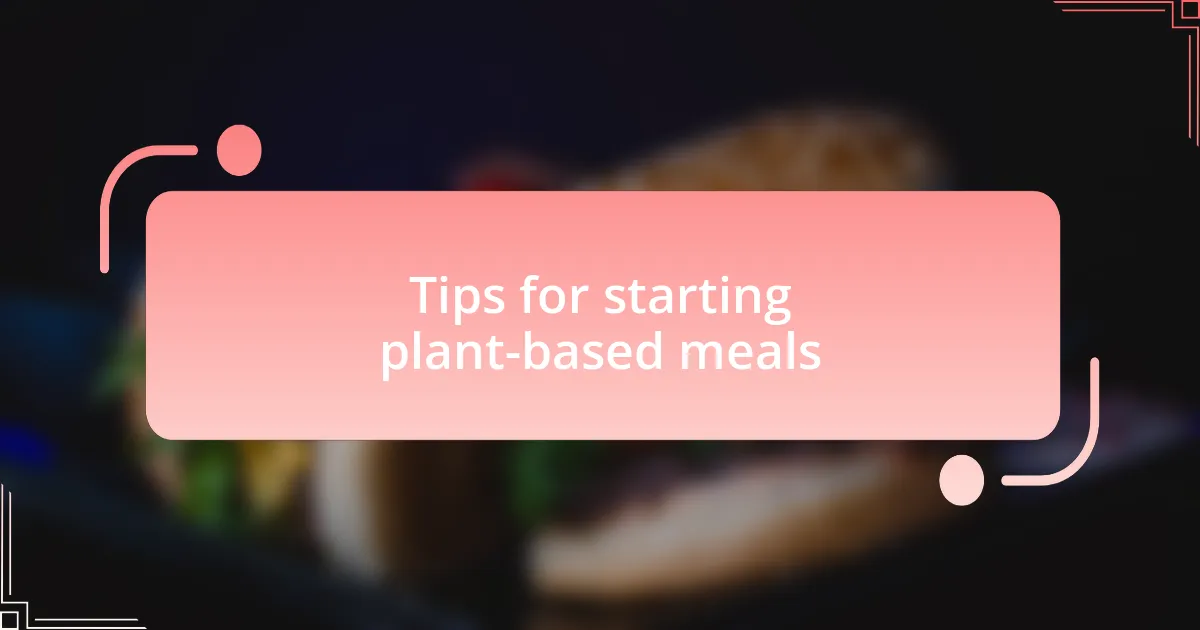
Tips for starting plant-based meals
Starting a plant-based journey can feel overwhelming, but I found that beginning with small, manageable changes made all the difference. For instance, I committed to one meat-free day a week, and it allowed me to explore new recipes without diving in headfirst. Have you tried dedicated meal days? They’re a fantastic way to experiment without the pressure of an entire diet overhaul.
Another tip is to explore your local markets for inspiration. I still vividly remember my first visit to a farmer’s market; the vibrant colors and varied offerings ignited my creativity. Suddenly, cooking became an adventure rather than a chore. I began to think, what can I make with this unique vegetable? This mindset shift helped me embrace seasonal produce and often led to delightful discoveries in flavor.
Don’t forget to stock your kitchen with essentials that make plant-based cooking easier! I learned this the hard way when I found myself without basic ingredients like lentils or chickpeas during meal prep time. By taking the time to build a pantry filled with staples like grains, legumes, and spices, I found that I could whip together delicious meals with what I had on hand. Trust me, having those go-to items can turn a panicked scramble into a satisfying culinary experience.
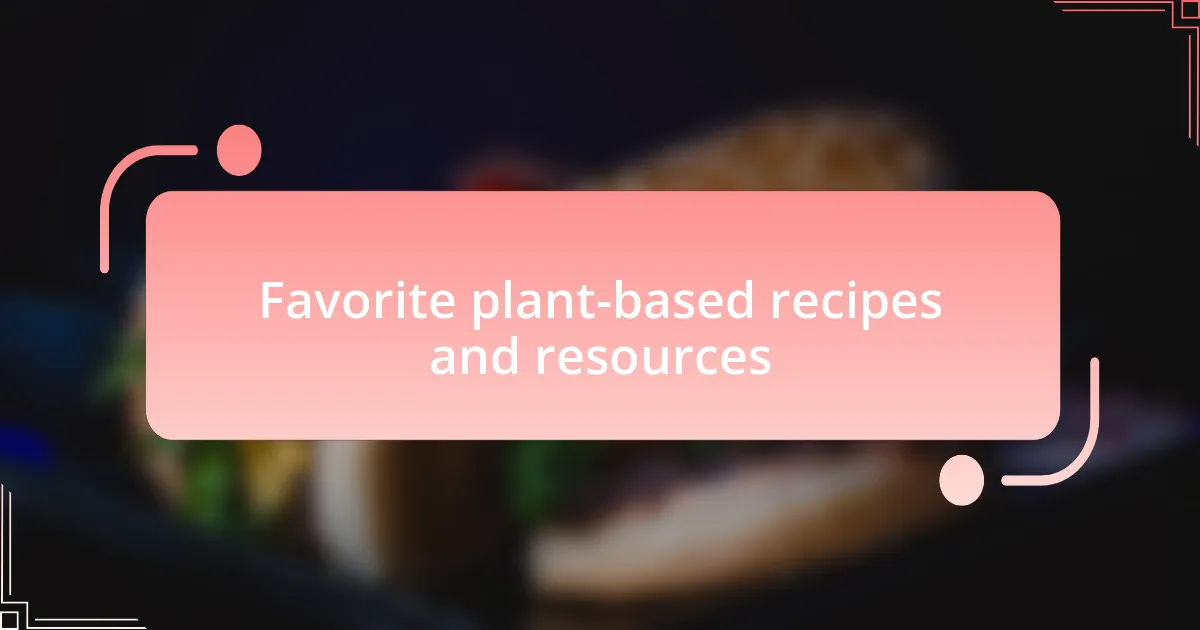
Favorite plant-based recipes and resources
When it comes to my favorite plant-based recipes, I can’t help but rave about my go-to chickpea curry. It was during a rainy evening when I first tried it. The warmth of the spices and the creaminess of coconut milk on my palate felt like a comforting hug. Each bite made me wonder how I once thought plant-based meals were bland; they’re bursting with flavor and are truly satisfying.
Another delightful surprise has been discovering the world of plant-based baking. I remember the first time I replaced eggs with flaxseed meal in a chocolate chip cookie recipe. The cookies turned out soft and chewy, not to mention that they vanished quickly at a family gathering. Have you ever experienced the thrill of seeing loved ones enjoy a dish you made? It’s one of the most rewarding feelings in this culinary journey.
For resources, I highly recommend browsing through online cooking classes or YouTube channels dedicated to plant-based meals. One channel that had a significant impact on me featured chefs who provided tips while making recipes that looked both fun and accessible. Watching those videos opened my eyes to new techniques and flavors, almost making me feel like I was cooking alongside a friend. Trust me, getting inspired by others can turn cooking into an exciting adventure rather than a task.